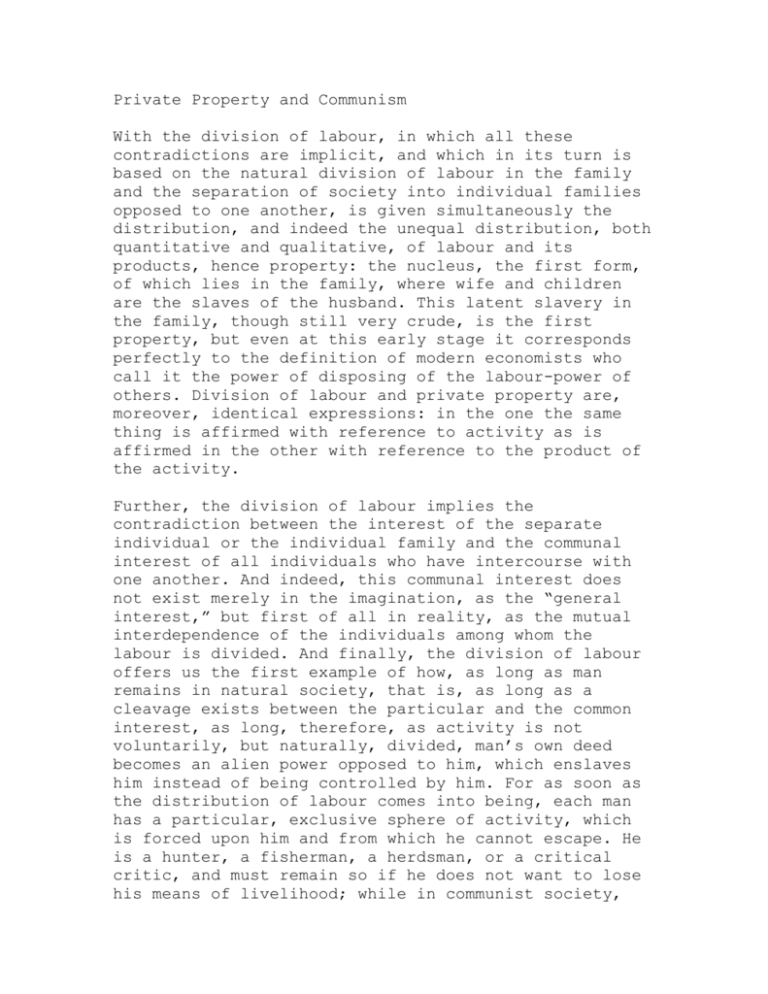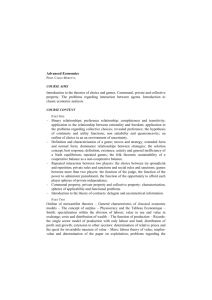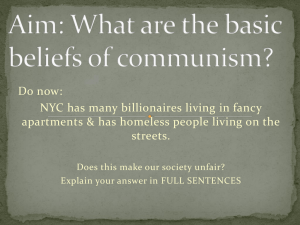Private Property and Communism
advertisement

Private Property and Communism With the division of labour, in which all these contradictions are implicit, and which in its turn is based on the natural division of labour in the family and the separation of society into individual families opposed to one another, is given simultaneously the distribution, and indeed the unequal distribution, both quantitative and qualitative, of labour and its products, hence property: the nucleus, the first form, of which lies in the family, where wife and children are the slaves of the husband. This latent slavery in the family, though still very crude, is the first property, but even at this early stage it corresponds perfectly to the definition of modern economists who call it the power of disposing of the labour-power of others. Division of labour and private property are, moreover, identical expressions: in the one the same thing is affirmed with reference to activity as is affirmed in the other with reference to the product of the activity. Further, the division of labour implies the contradiction between the interest of the separate individual or the individual family and the communal interest of all individuals who have intercourse with one another. And indeed, this communal interest does not exist merely in the imagination, as the “general interest,” but first of all in reality, as the mutual interdependence of the individuals among whom the labour is divided. And finally, the division of labour offers us the first example of how, as long as man remains in natural society, that is, as long as a cleavage exists between the particular and the common interest, as long, therefore, as activity is not voluntarily, but naturally, divided, man’s own deed becomes an alien power opposed to him, which enslaves him instead of being controlled by him. For as soon as the distribution of labour comes into being, each man has a particular, exclusive sphere of activity, which is forced upon him and from which he cannot escape. He is a hunter, a fisherman, a herdsman, or a critical critic, and must remain so if he does not want to lose his means of livelihood; while in communist society, where nobody has one exclusive sphere of activity but each can become accomplished in any branch he wishes, society regulates the general production and thus makes it possible for me to do one thing today and another tomorrow, to hunt in the morning, fish in the afternoon, rear cattle in the evening, criticise after dinner, just as I have a mind, without ever becoming hunter, fisherman, herdsman or critic. This fixation of social activity, this consolidation of what we ourselves produce into an objective power above us, growing out of our control, thwarting our expectations, bringing to naught our calculations, is one of the chief factors in historical development up till now. [2] The social power, i.e., the multiplied productive force, which arises through the co-operation of different individuals as it is determined by the division of labour, appears to these individuals, since their co-operation is not voluntary but has come about naturally, not as their own united power, but as an alien force existing outside them, of the origin and goal of which they are ignorant, which they thus cannot control, which on the contrary passes through a peculiar series of phases and stages independent of the will and the action of man, nay even being the prime governor of these. How otherwise could for instance property have had a history at all, have taken on different forms, and landed property, for example, according to the different premises given, have proceeded in France from parcellation to centralisation in the hands of a few, in England from centralisation in the hands of a few to parcellation, as is actually the case today? Or how does it happen that trade, which after all is nothing more than the exchange of products of various individuals and countries, rules the whole world through the relation of supply and demand – a relation which, as an English economist says, hovers over the earth like the fate of the ancients, and with invisible hand allots fortune and misfortune to men, sets up empires and overthrows empires, causes nations to rise and to disappear – while with the abolition of the basis of private property, with the communistic regulation of production (and, implicit in this, the destruction of the alien relation between men and what they themselves produce), the power of the relation of supply and demand is dissolved into nothing, and men get exchange, production, the mode of their mutual relation, under their own control again? History as a Continuous Process In history up to the present it is certainly an empirical fact that separate individuals have, with the broadening of their activity into world-historical activity, become more and more enslaved under a power alien to them (a pressure which they have conceived of as a dirty trick on the part of the so-called universal spirit, etc.), a power which has become more and more enormous and, in the last instance, turns out to be the world market. But it is just as empirically established that, by the overthrow of the existing state of society by the communist revolution (of which more below) and the abolition of private property which is identical with it, this power, which so baffles the German theoreticians, will be dissolved; and that then the liberation of each single individual will be accomplished in the measure in which history becomes transformed into world history. From the above it is clear that the real intellectual wealth of the individual depends entirely on the wealth of his real connections. Only then will the separate individuals be liberated from the various national and local barriers, be brought into practical connection with the material and intellectual production of the whole world and be put in a position to acquire the capacity to enjoy this all-sided production of the whole earth (the creations of man). All-round dependence, this natural form of the world-historical co-operation of individuals, will be transformed by this communist revolution into the control and conscious mastery of these powers, which, born of the action of men on one another, have till now overawed and governed men as powers completely alien to them. Now this view can be expressed again in speculative-idealistic, i.e. fantastic, terms as “selfgeneration of the species” (“society as the subject”), and thereby the consecutive series of interrelated individuals connected with each other can be conceived as a single individual, which accomplishes the mystery of generating itself. It is clear here that individuals certainly make one another, physically and mentally, but do not make themselves. [5. Development of the Productive Forces as a Material Premise of Communism] This “alienation” (to use a term which will be comprehensible to the philosophers) can, of course, only be abolished given two practical premises. For it to become an “intolerable” power, i.e. a power against which men make a revolution, it must necessarily have rendered the great mass of humanity “propertyless,” and produced, at the same time, the contradiction of an existing world of wealth and culture, both of which conditions presuppose a great increase in productive power, a high degree of its development. And, on the other hand, this development of productive forces (which itself implies the actual empirical existence of men in their world-historical, instead of local, being) is an absolutely necessary practical premise because without it want is merely made general, and with destitution the struggle for necessities and all the old filthy business would necessarily be reproduced; and furthermore, because only with this universal development of productive forces is a universal intercourse between men established, which produces in all nations simultaneously the phenomenon of the “propertyless” mass (universal competition), makes each nation dependent on the revolutions of the others, and finally has put world-historical, empirically universal individuals in place of local ones. Without this, (1) communism could only exist as a local event; (2) the forces of intercourse themselves could not have developed as universal, hence intolerable powers: they would have remained home-bred conditions surrounded by superstition; and (3) each extension of intercourse would abolish local communism. Empirically, communism is only possible as the act of the dominant peoples “all at once” and simultaneously, which presupposes the universal development of productive forces and the world intercourse bound up with communism. Moreover, the mass of propertyless workers – the utterly precarious position of labour – power on a mass scale cut off from capital or from even a limited satisfaction and, therefore, no longer merely temporarily deprived of work itself as a secure source of life – presupposes the world market through competition. The proletariat can thus only exist worldhistorically, just as communism, its activity, can only have a “world-historical” existence. World-historical existence of individuals means existence of individuals which is directly linked up with world history. Communism is for us not a state of affairs which is to be established, an ideal to which reality [will] have to adjust itself. We call communism the real movement which abolishes the present state of things. The conditions of this movement result from the premises now in existence. In the main we have so far considered only one aspect of human activity, the reshaping of nature by men. The other aspect, the reshaping of men by men .... [Intercourse and productive power] Origin of the state and the relation of the state to civil society. ... Footnotes Contradiction between Individuals and their conditions of life 1. The building of houses. With savages each family has as a matter of course its own cave or hut like the separate family tent of the nomads. This separate domestic economy is made only the more necessary by the further development of private property. With the agricultural peoples a communal domestic economy is just as impossible as a communal cultivation of the soil. A great advance was the building of towns. In all previous periods, however, the abolition of individual economy, which is inseparable from the abolition of private property, was impossible for the simple reason that the material conditions governing it were not present. The setting-up of a communal domestic economy presupposes the development of machinery, of the use of natural forces and of many other productive forces – e.g. of water-supplies, of gas-lighting, steam-heating, etc., the removal [of the antagonism] of town and country. Without these conditions a communal economy would not in itself form a new productive force; lacking any material basis and resting on a purely theoretical foundation, it would be a mere freak and would end in nothing more than a monastic economy – What was possible can be seen in the towns brought about by condensation and the erection of communal buildings for various definite purposes (prisons, barracks, etc.). That the abolition of individual economy is inseparable from the abolition of the family is self-evident. 2. [This paragraph appears as a marginal note in the manuscript – Ed.] And out of this very contradiction between the interest of the individual and that of the community the latter takes an independent form as the State, divorced from the real interests of individual and community, and at the same time as an illusory communal life, always based, however, on the real ties existing in every family and tribal conglomeration – such as flesh and blood, language, division of labour on a larger scale, and other interests – and especially, as we shall enlarge upon later, on the classes, already determined by the division of labour, which in every such mass of men separate out, and of which one dominates all the others. It follows from this that all struggles within the State, the struggle between democracy, aristocracy, and monarchy, the struggle for the franchise, etc., etc., are merely the illusory forms in which the real struggles of the different classes are fought out among one another (of this the German theoreticians have not the faintest inkling, although they have received a sufficient introduction to the subject in the Deutsch-Französische Jahrbücher and Die heilige Familie). Further, it follows that every class which is struggling for mastery, even when its domination, as is the case with the proletariat, postulates the abolition of the old form of society in its entirety and of domination itself, must first conquer for itself political power in order to represent its interest in turn as the general interest, which in the first moment it is forced to do. Just because individuals seek only their particular interest, which for them does not coincide with their communal interest (in fact the general is the illusory form of communal life), the latter will be imposed on them as an interest “alien” to them, and “independent” of them as in its turn a particular, peculiar “general” interest; or they themselves must remain within this discord, as in democracy. On the other hand, too, the practical struggle of these particular interests, which constantly really run counter to the communal and illusory communal interests, makes practical intervention and control necessary through the illusory “general” interest in the form of the State.






